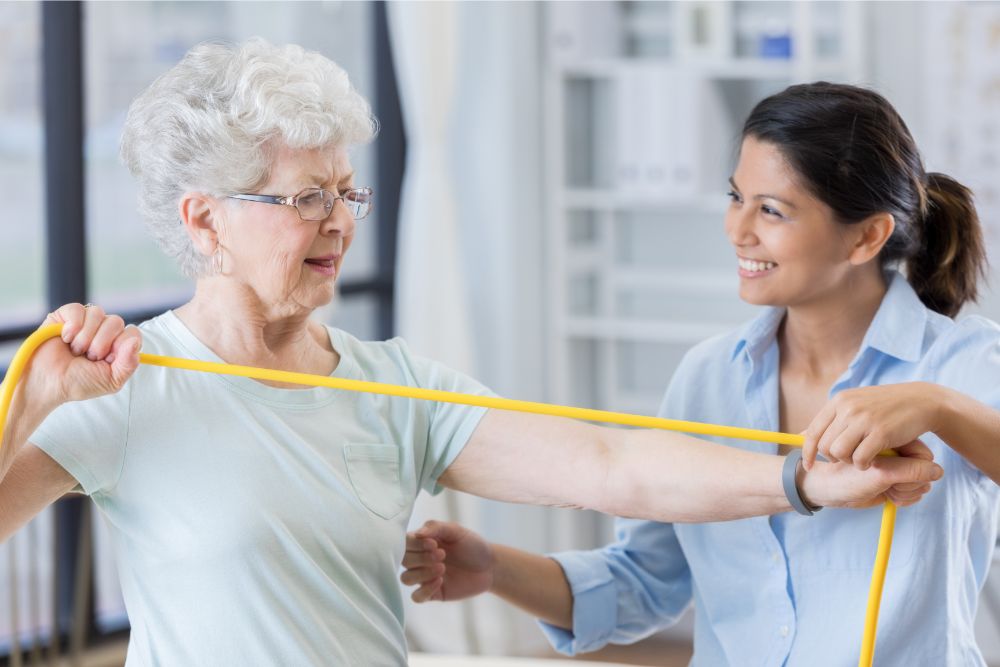Assisted living provides seniors with customized care that supports both independence and needed on-site support and medical care. When choosing an assisted living facility for yourself or for a loved one, it is important that you also seek one out that includes regular physical therapy. Physical therapy offers several unique benefits to seniors in assisted living and should be a regular part of every senior’s routine.
Types of Physical Therapy
Physical therapy can be administered as part of a temporary recuperative routine or as part of a long-term care plan. Most seniors, for example, will require some amount of physical therapy after going through medical treatment, surgery, or after suffering an injury. Additionally, longer-term recuperative therapy may be necessary if a senior has suffered a stroke or is dealing with osteoarthritis, Parkinson’s Disease, or another similar condition or chronic disease.
However, physical therapy can also be administered as part of a preventative health and wellness routine. Many of the benefits of physical therapy are surprisingly helpful to all seniors, whether they are experiencing present health issues or not. For example, physical therapy can:
- Eliminate or even reduce pain
- Improve mobility
- Help with balance and fall prevention
- Help manage heart conditions
- Reduce the need for intravenous medical care, such as surgery
- Generally reduce age-related health issues
Whether a senior is recovering from a medical issue, in need of long-term care, or generally wants to incorporate healthier preventative exercise into their routine, physical therapy is a necessary part of that care.
Licensed Physical Therapists
Physical therapy must always be provided by a licensed physical therapist. Additionally, a patient’s physician will need to be involved in the decision-making to add therapy to their regular regimen or treatment plan. The benefit of offering physical therapy in an assisted living facility is that the medical support staff is already built-in and offered. Further, the physical therapists are board certified and are licensed to carry out any and all treatment plans.
What to Expect From Physical Therapy
Specific services will depend on particular needs and will be individualized for each senior. However, generally, physical therapy will include some combination of walking, massage, stretching, strength training, and even hydrotherapy. Initial evaluations will include a range of motion tests, strength tests, and mobility tests. Seniors should expect to wear comfortable, athletic clothing that allows for a free range of motion.
Most often, physical therapists will teach seniors fall prevention exercises. Falling is the number one cause of injury among seniors, and learning good fall prevention techniques and exercises can help ensure they are safe and can reduce the risk of injury by being less prone to falls.
Physical therapists will also address specific health concerns derived from the evaluation. They understand the sorts of conditions faced by their patients and can create a tailored treatment plan that addresses these concerns. Often, this may include incorporating the use of modalities into treatment, such as using a walk-in hydrotherapy tub, like the ones at our Highlands Ranch assisted living facility, the Silver Maple Home.
When combined with the various other services already provided at an assisted living facility, such as daily living support, activity programming, on-site physician visits, and housekeeping, physical therapy offers an overall improved quality of life for all seniors.
Additional Benefits of Physical Therapy
In addition to the physical health benefits, such as improved mobility and reduced pain, physical therapy also offers positive social benefits. Increased physical activity in older adults can:
- Improve mood
- Boost confidence
- Improve social connections
- Promote fulfillment and satisfaction
- Improve mental health
- Help with adjusting to new environments
- Improve concentration, teamwork, and cooperation
FAQs
Q: How Would the Elderly Benefit From Physical Therapy?
A: For the elderly, physical therapy provides significant benefits to their quality of life, helping seniors regain independence. Physical therapy can help address issues that arise as a natural part of aging, such as providing stability to help mitigate the risk of falling, treating chronic pain, and lessening the dependence on prescription drugs. Physical therapy improves muscle strength, flexibility, and overall mobility, which contributes to a much healthier lifestyle.
Q: What Are the Benefits of Physical Therapy?
A: Physical therapy, contrary to common belief, is not solely focused on the care of the body. Physical therapy encourages and improves communication, increases overall motivation, and provides more awareness for family members. It is great at managing common symptoms among the elderly, such as loss of balance, muscle weakness, and fatigue. By encouraging a regular routine, participation in sports, and other social activities, seniors who engage in physical therapy generally lead healthier and happier lives.
Q: What Are the Social Benefits of Physical Therapy?
A: Physical therapy offers an equal amount of social benefits to physical benefits. Particularly among seniors, confidence is a key component to a healthy social life, and being physically active improves confidence. So much of being social is rooted in feeling good about yourself. By consistently exercising, seniors can maintain a healthy weight, a positive mood, and will have a healthy release from stress. Lastly, physical therapy engages seniors with other active members and equips them for more social activities.
Q: Do Dementia Patients Benefit From Physical Therapy?
A: Physical therapy offers a higher quality of life for seniors – especially for dementia patients. Dementia patients can often lack motivation. Physical therapy establishes structure and routine, which provides patients with a regular motivating activity. Accomplishments help us all to feel productive, and this is just as true for patients with dementia. Physical therapy helps to improve overall cognitive ability, brain function, and memory, as well as physical symptoms common among dementia patients, such as fatigue and balance issues.
Physical therapy offers innumerable benefits to seniors that include improvements to the quality of their physical, mental, and social lives. Because of these benefits, it is important that you look for an assisted living facility that offers this essential service. If you or your loved one is ready to make the transition to an assisted living facility or to move into one that offers physical therapy, then contact us today to learn more.


